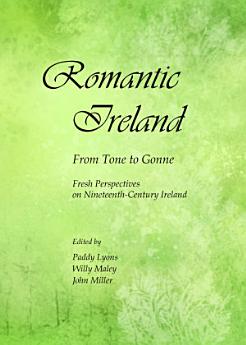Romantic Ireland: From Tone to Gonne; Fresh Perspectives on Nineteenth-Century Ireland
About this ebook
Bringing together an international line-up of established and emerging scholars, Romantic Ireland: From Tone to Gonne takes Irish Studies in new directions, in particular in terms of a cross-cultural comparison with Scotland and the distinct phenomenon of Unionism, thus breaking out of the double binds of Anglo-Irish approaches. The Irish-Scottish interface throws up fascinating insights that enhance our awareness of the interaction between colonialism, nationalism and culture. All of the major figures of the period are represented here, from Edgeworth and Moore to Yeats and Synge, but there are other, often less noticed but hugely significant writers, such as Charles Robert Maturin, Dion Boucicault and May Laffan. There are non-Irish commentators on Ireland like Cobbett and Engels, as well as a series of key Scottish figures – including Burns and Scott – in addition to lesser-known or lesser-noticed Scottish writers with strong Irish interests such as R. M. Ballantyne and Robert Tannahill – whose work opens up new and promising avenues into Irish writing.
Ratings and reviews
About the author
Willy Maley is Professor of English Literature at the University of Glasgow. His most recent work is an edited collection, with Alison O’Malley-Younger, Celtic Connections: Irish-Scottish Relations and the Politics of Culture (Peter Lang, 2013).
John Miller is Lecturer in Nineteenth-century Literature at the University of Sheffield. He is author of Empire and the Animal Body (Anthem Press, 2012) and co-author, with Louise Miller, of Walrus for Reaktion Press’s Animal series.







